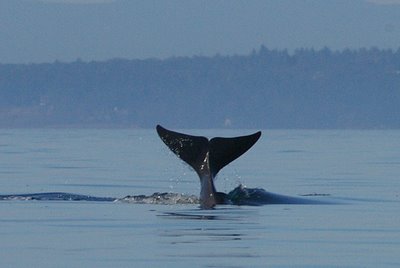
Christmas came a little early this year for the Puget Sound's orca population, in the gift of a ruling from federal Judge Thomas Zilly, who dismissed the Building Industry Association's lawsuit against the endangered-species listing for the region's killer whales -- and dismissed it with prejudice, which means that they can't refile the lawsuit but can only appeal the ruling, which isn't likely.
The BIAW and its cohort, the Farm Bureau, were predictably nonplussed about it all:
- In his decision, Zilly said the builders and farmers don't have the legal right to challenge the federal government's decision to protect the orcas as endangered because lawyers failed to provide evidence that the listing harms the two groups. That didn't please Brooks or his clients.
"Why in the world do we have to wait until someone actually loses their livelihood?" asked Brooks, who works for the Pacific Legal Foundation, which specializes in property rights cases.
Foes of the listing have argued that building regulations and other land-use restrictions based on the listing would unnecessarily hinder farming and construction.
The P-I report has more regarding their objections:
- In his ruling, Judge Thomas Zilly stated that the building and farming groups that brought the suit had not proved that they would be harmed by the protection of the orcas under the Endangered Species Act.
"Remarkably, plaintiffs have totally failed to provide any evidence of standing," Zilly stated.
The case was dismissed with prejudice, meaning the groups can't bring it back to court.
Russell Brooks, the Pacific Legal Foundation lawyer who represented the Building Industry Association of Washington and the Washington Farm Bureau, said Zilly "is punting. That's the nicest, most PC way to say it. The judge has an out, and he doesn't want to reach the hard issues."
Brooks said it's possible but not likely his clients will appeal.
Zilly "basically said don't come back until your water is shut off or your building permit is denied," Brooks said.
The suit he brought predicted that protecting the orcas would result in water and land-use restrictions near rivers inhabited by salmon, the orcas' prime food source, and that ultimately farmers could face fines and imprisonment.
I have some background on the BIAW lawsuit here, and I discussed it in my Seattle Weekly piece from earlier this year.
It's true that Zilly's ruling short-circuited any determination of the BIAW's main contention, namely, that the listing itself violated the ESA's basic structure. As Brooks told me for the Weekly piece:
- "The fisheries service can only evaluate for listing purposes, and then list, . . . a species, a subspecies, or a distinct population segment of a species. That's very clear under the law in the [Endangered Species Act's] terms," Brooks says. He claims the southern resident orcas don't fit any of these categories, but are rather "a distinct population segment of a subspecies, which is pretty clearly not allowed under ESA case law."
Brooks says that the opponents haven't consulted any scientists on the matter. "We don't really need any scientists backing us up on it, because it's a legal argument. . . . It's not a factual dispute, it's not a scientific dispute, it's a pure legal dispute.
"It's not that we're against orcas or anything like that. . . . It could be any other species. You know, we love orcas as much as anyone else. But here we believe there's a much larger legal issue that is at stake, and it just happens to involve orcas."
It's hard to imagine Brooks' case in this area succeeding either. The problem is that he's assuming that killer whales are not generically constituted of subspecies, as though there is some kind of overall generic killer whale population that is distinct from these subspecies. But the biology of orcas doesn't work that way; there is in fact a global population of killer whales constituted of a range of subspecies.
There are resident killer whales in a variety of locales, including the Puget Sound, Alaska, Iceland, Antarctica, New Zealand, and Argentina (to name just a few; killer whales actually appear in every ocean on the planet). Then there are so-called "transient" killer whales that travel great distances over long-established territories, such as those we find here who travel from the Baja to Alaska in search of food. These populations are all distinct subspecies, and genetically the animals are identical, though behaviorally they are all quite distinct. The ESA is written in a way that allows us to protect those distinct populations.
In any event, Zilly's ruling is welcome news:
- Steve Mashuda, a lawyer for Earthjustice, which sued to obtain the listing on behalf of Munro and others, said the fact that the case was dismissed with prejudice is significant. Under these circumstances, a successful appeal is unlikely. Also, the builders and farmers can't file another challenge.
"They don't get another bite at the apple," he said. "I think it's pretty cut and dried.
"This was the only cloud over the listing," Mashuda said. "I don't think it's unfair to say that the holidays came early for the orcas this year."
Now that this cloud has been banished, we can only hope the hard work of saving these populations will begin in earnest.